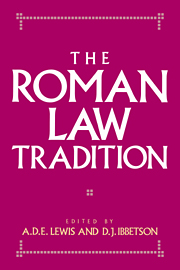Book contents
- Frontmatter
- Contents
- List of contributors
- Foreword: Peter Stein, Regius Professor of Civil Law in the University of Cambridge, 1968–1993
- List of abbreviations
- 1 The Roman law tradition
- 2 Labeo and the fraudulent slave
- 3 Doing and causing to be done
- 4 The danger of definition: contrectatio and appropriation
- 5 Going to the fair – Jacques de Révigny on possession
- 6 Bembo giureconsulto?
- 7 Gentilis and the interpretatio duplex
- 8 Ius gentium in the practice of the Court of Admiralty around 1600
- 9 Stair's title ‘Of Liberty and Servitude’
- 10 The actio communi dividundo in Roman and Scots law
- 11 Sale and transfer of title in Roman and Scots law
- 12 ‘What Marcellus says is against you’: Roman law and Common law
- 13 Audi et alteram partem: a limit to judicial activity
- Index of sources
- Index of names and subjects
10 - The actio communi dividundo in Roman and Scots law
Published online by Cambridge University Press: 08 October 2009
- Frontmatter
- Contents
- List of contributors
- Foreword: Peter Stein, Regius Professor of Civil Law in the University of Cambridge, 1968–1993
- List of abbreviations
- 1 The Roman law tradition
- 2 Labeo and the fraudulent slave
- 3 Doing and causing to be done
- 4 The danger of definition: contrectatio and appropriation
- 5 Going to the fair – Jacques de Révigny on possession
- 6 Bembo giureconsulto?
- 7 Gentilis and the interpretatio duplex
- 8 Ius gentium in the practice of the Court of Admiralty around 1600
- 9 Stair's title ‘Of Liberty and Servitude’
- 10 The actio communi dividundo in Roman and Scots law
- 11 Sale and transfer of title in Roman and Scots law
- 12 ‘What Marcellus says is against you’: Roman law and Common law
- 13 Audi et alteram partem: a limit to judicial activity
- Index of sources
- Index of names and subjects
Summary
In a characteristically lucid and elegant essay written some thirty years ago Peter Stein observed that ‘The vague proposition that Scots law is “based on Roman law” is still widely canvassed today.’ At that time there were few detailed treatments of the precise extent of the debt owed by Scots law to Roman law; nor have many appeared since. Professor Stein's own writings have constituted an important step towards remedying this deficiency. This paper is intended as a modest contribution in the same direction.
Decisions of the Scots courts arising from disputes between persons holding ownership of land in common have on occasion referred to two actions known to Roman law. These are the actio familiae erciscundae and the actio communi dividundo, the former lying for the division of property falling within an inheritance, and the latter being available to co-owners other than heirs. Scots law did not in fact, from the point of the view of the remedies, distinguish between the case in which heirs sought a partition of land inherited in common and that in which other co-owners sought a partition. Although references to both the Roman actions are found in the works of the institutional writers and the judgments of the courts, the actio communi dividundo has tended to assume the larger role. Hence I have omitted specific consideration of the actio familiae erciscundae.
- Type
- Chapter
- Information
- The Roman Law Tradition , pp. 159 - 181Publisher: Cambridge University PressPrint publication year: 1994



